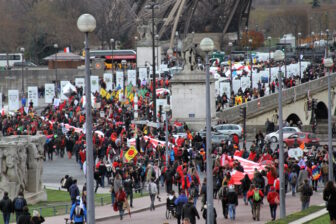It’s true that most people from south Louisiana are either friends with or related to someone who works in the oil and gas industry. Myself included.
I used to be one of those Louisiana environmentalists who tip-toe around the issue of ending offshore drilling in the Gulf because of what it supposedly will mean for Louisiana workers.
But my recent journey to Paris for the international climate talks — COP21, short for the 21st annual Conference of the Parties — forever changed my perspective, and here’s why: I can no longer in good conscience claim to be an advocate for solving our coastal crisis if it means turning a blind eye to one of the root causes of that crisis: oil extraction. Indulging the unending thirst for more fossil fuels is a source of overwhelming pain and destruction to the planet and its inhabitants.
On the last day of the negotiations, in December, I marched through the Paris streets with some 10,000-plus people from all over the world who are suffering directly from climate change. Many of these people represented poorer nations that did very little to contribute to the global climate crisis. Their pain, anger, sadness and frustration were palpable. Still, it was an incredibly beautiful and inspiring experience to be among thousands marching in unity from the Avenue de la Grande Armée near the Arc de Triomphe, across the Seine and beneath the Tour Eiffel to a mass rally in the Parc du Champs de Mars.
Indeed, our state’s very survival depends on an absurdity …
I went to Paris seeking inspiration, and I found it. I also found renewed hope for our future, and, to be blunt, hope had been waning after years of experiencing first-hand the impacts of climate change and fossil fuel extraction on our beloved Gulf Coast. The people I met in Paris gave me the courage to keep on fighting as well as the sense of responsibility to come back home, share their stories of suffering and help fight for their futures as well.
There’s no question that some good came from the Paris agreement adopted at least tentatively by 196 nations, pending ratification by home governments ahead of an April 22 deadline set to coincide with Earth Day. At the very least the accord was an acknowledgment by world powers that the climate crisis is real and action needed. But, the bottom line is that COP21 sets the world on course to a global temperature increase of 3 degrees Celsius by 2100.
For some countries, that’s better than a runaway temperature rise, but it means Louisiana remains in deep, deep trouble. Acknowledgment that the Arctic is melting does nothing to keep that from happening. And COP21 won’t save tiny island nations such as Kiribati in the Pacific, won’t keep Australia’s Great Barrier Reef from bleaching, or stop the warming of the Swiss Alps. Yet, in Louisiana most of our congressional delegation denies that climate change is real and has tried to defeat every piece of climate legislation ever considered on Capitol Hill.
The irony is that many Louisiana communities, while geographically part of the world’s richest nation, are experiencing the same immediate climate impacts as poorer nations. And in Louisiana, as in many of those nations, the people who are suffering the most are typically poor, indigenous, and of color. They lack the resources to adapt or relocate.
The difference between Louisiana and the poor nations at greatest risk is that we continue to protect the very industry that contributes most heavily to the problem. Indeed, our state’s very survival depends on an absurdity: Congress, in its dubious wisdom, has inextricably tied financing for coastal recovery to continuing fossil fuel extraction, the root cause of our coastline’s accelerating collapse.
The flow of promised coastal-restoration dollars depends on offshore drilling royalties, which means more fossil fuel extraction, more carbon pollution and therefore more rising and warming seas and more powerful hurricanes. Ultimately it means losing even more land than the 2,000 square miles that have washed away in the past hundred years or so.
This short-sighted financing scheme will not save our coastal communities and will make problems worse globally. This is what you call climate injustice and it cannot be, must not be, and is not the solution. It is not fair to the people of Dulac, Morgan City, the United Houma Nation, Ironton, Grand Bayou Village, Isle de Jean Charles, St. Bernard Parish and, yes, even New Orleans.
So, like the thousands of people who took to the streets of Paris carrying giant red banners to symbolize the red lines that they didn’t want negotiators to cross in trying to reach an international climate accord, we too must hold the red line in Louisiana by banning all new leases for offshore drilling in the Gulf of Mexico. We must call on the industry that has made trillions of dollars from fossil fuel extraction in the Gulf and in our wetlands to put up the billions it will take to give us a fighting chance to survive here for another generation.
Will workers lose their jobs? In the short run, yes, as they have at every turning point in industrial history. Recent employment patterns teach us that the real cause of lost jobs is the price per barrel of oil and the industry’s disloyalty to its own employees when times get tough. We must prepare to retrain the castoffs, and we should start now. Costs will be high, but the price for our continuing addiction to fossil fuel extraction will be higher still.
To intone a chant heard repeatedly in Paris, Changeons le systeme pas le climat! Let’s change the system, not the climate!
Jonathan Henderson, JD, MBA is the founding director of Vanishing Earth. Prior to launching Vanishing Earth in 2015, he spent over seven years on staff at the New Orleans-based Gulf Restoration Network.




